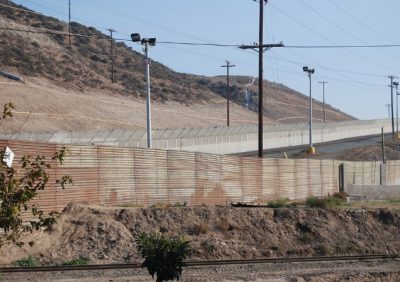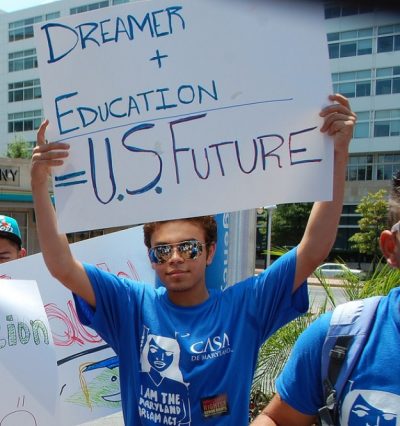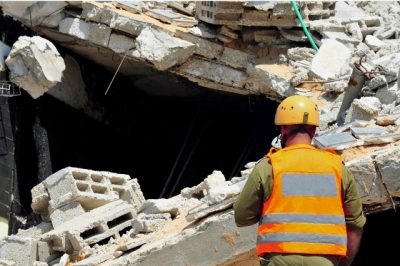Border Enforcement
Migration at the border is a multifaceted issue, challenging the U.S. to secure our borders while upholding the human rights of individuals seeking safety and better opportunities. Balancing national security with compassion and our legal obligations to asylum seekers presents intricate dilemmas, and we collaborate with policymakers to advance bipartisan, action-oriented solutions.
Beyond A Border Solution
- Asylum
- May 3, 2023
America needs durable solutions. These concrete measures can bring orderliness to our border and modernize our overwhelmed asylum system. Read…
Read More
Arizona Faces Lawsuit over DACA Driver’s License Policy
Less than six months after it received a stinging rebuke from the Supreme Court, Arizona today was hit with another major lawsuit over its punitive immigration policies—this time challenging its practice of denying driver’s licenses to beneficiaries of the Deferred Action for Childhood Arrivals (DACA) program. Filed in federal court in Phoenix, the class-action suit challenges an executive order issued by Gov. Jan Brewer making DACA recipients ineligible for all public benefits. Although the suit is limited to Arizona’s policy, the outcome could affect DACA recipients’ ability to obtain driver’s licenses in other states as well. Read More

This Week’s Immigration Proposals: Old News, Old Ideas
If you follow immigration, but are returning from a month-long, news-free vacation, there’s only one conclusion you would draw from the legislation Republicans offered up this week in Congress: Mitt Romney must have won the presidential election. After all, the ACHIEVE Act, introduced yesterday by retiring Senators Jon Kyl (R-AZ) and Kay Bailey Hutchison (R-TX), which offers temporary legal status but no path to citizenship to DREAMers, is surely the bill they were preparing to offer in the event that a Romney Administration was in the wings. And on the House side, a slightly revised version of the STEM Jobs Act—which failed on the suspension calendar before the election—is back on the floor at the end of this week without changing any of the problems that led to its defeat before. Surely, this suggests that the predictions that immigration would play a decisive role in the presidential election didn’t pan out and that self-deportation as an immigration reform strategy worked. Except, none of this is true. Read More

Kris Kobach Continues Digging Immigration Hole
Despite a general consensus that adopting “self-deportation” as immigration policy helped sink Mitt Romney’s White House aspirations, the architect of this philosophy, Kansas Secretary of State Kris Kobach, isn’t ready to give in. Kobach doesn’t seem to care that most in his party have awakened to the fact that they are in a “death spiral” with Latino voters because of intolerant rhetoric around immigration. Nor does he seem fazed that dozens of young DREAM activists in his state protested at his office last week, demanding his resignation. Read More

A Look at Immigrant Detention Facilities: Abuses and Proposed Reform
Last week, Detention Watch Network (DWN) launched its “Expose and Close” campaign, an initiative designed to reveal the egregious human rights violations taking place in immigrant detention facilities throughout the United States and to advocate for reform. As part of this campaign, DWN, in collaboration with human rights advocates, community organizers, legal service providers, and faith groups, released ten reports highlighting the inhumane living conditions at some of the country’s worst detention centers. The reports detail accounts of physical and psychological abuse, including sexual abuse, inadequate medical care, and prolonged solitary confinement. Read More

BREAKING: DACA Approvals Surpass 50,000
Earlier this afternoon, the Obama administration released updated statistics indicating that 53,273 undocumented youths have been granted relief under the Deferred Action for Childhood Arrivals (DACA) program. As of November 15, U.S. Citizenship and Immigration Services (USCIS) had received more than 300,000 requests for deferred action, with most… Read More

Conservatives Who Support Immigration Reform Need to Rethink Border Security
The elections have produced nothing short of an immigration epiphany among some conservative commentators and politicians. Spurred by the electoral beating that Republican candidates suffered at the hands of Latino voters, pundits and lawmakers who once advocated an enforcement-only solution to the problem of unauthorized immigration are now talking about a pathway to legalization. While this new-found pro-legalization stance is highly commendable, it is being coupled with distinctly old-fashioned notions of border security. Legalization programs are being proposed along with border walls as the solution for our border-security weaknesses. However, walls which try (and fail) to keep people out of the country won’t make us safer. The real target of border-security measures should be the cartels that smuggle immigrants, money, drugs, and guns across the border—not the immigrants, money, drugs, and guns themselves. Read More

Watchdog Report Offers Misdiagnosis of Immigration Court Backlog
With more than 325,000 cases pending at the start of October, our nation’s immigration courts are indisputably operating under a crushing backlog. The only question is whether and how it can be resolved. In a little-noticed report issued in early November, the Inspector General of the Justice Department levied a number of criticisms regarding the length of time needed to decide individual cases. Although the report makes a few valid points, its ultimate recommendations would prioritize the quantity of decisions made over the quality of decisions issued. Read More

Understanding the Important Symbolism of the Maryland DREAM Act Victory
While much of last week’s energy was focused on Latino voter turnout in the Presidential race— and the subsequent recognition that immigration reform was all but inevitable—there was another major victory for immigration policy that came out of Maryland. Voters in the state supported through referendum their legislature’s decision to provide in-state tuition to undocumented students. This was the first vote of its kind in the nation and one where African-American voters were an important voting bloc in support of the measure. Read More

Immigrant Workers Likely to Play Big Role in Post-Sandy Reconstruction
Hurricane Sandy may be gone, but the monumental task of reconstruction remains. In New Jersey and New York in particular, thousands of workers will be needed to rebuild or restore roads, homes, and office buildings damaged or destroyed by the storm. If history is any guide, many of those workers will be immigrants, and many of those immigrants will be unauthorized. Ironically, as they play an outsized role in reconstruction after a natural disaster, immigrant workers will be especially vulnerable to abuse and exploitation by unscrupulous employers. As a result, federal and state officials must be vigilant in ensuring that labor laws are vigorously enforced to protect all workers involved in post-Sandy reconstruction efforts. Read More

Could DACA Have Happened Without Public Engagement at USCIS?
Approximately two months after the program opened, nearly 200,000 individuals have submitted requests for grants under the Deferred Action for Childhood Arrivals (DACA) imitative. It’s still too early to assess the overall success of the program or evaluate the grant rates, but it isn’t too early to take note of the important role that preparation played in making DACA a reality. Read More
Make a contribution
Make a direct impact on the lives of immigrants.

